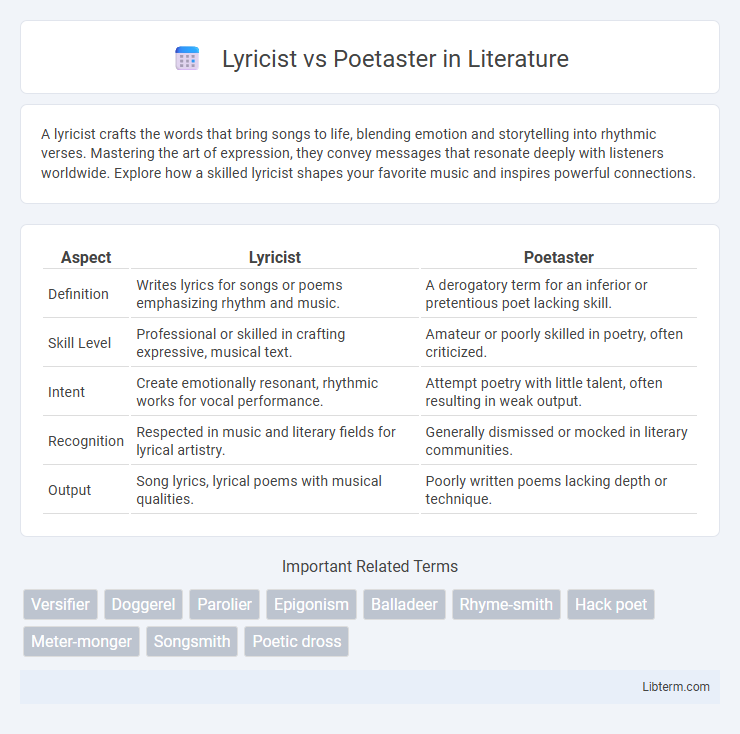A lyricist crafts the words that bring songs to life, blending emotion and storytelling into rhythmic verses. Mastering the art of expression, they convey messages that resonate deeply with listeners worldwide. Explore how a skilled lyricist shapes your favorite music and inspires powerful connections.
Table of Comparison
| Aspect | Lyricist | Poetaster |
|---|---|---|
| Definition | Writes lyrics for songs or poems emphasizing rhythm and music. | A derogatory term for an inferior or pretentious poet lacking skill. |
| Skill Level | Professional or skilled in crafting expressive, musical text. | Amateur or poorly skilled in poetry, often criticized. |
| Intent | Create emotionally resonant, rhythmic works for vocal performance. | Attempt poetry with little talent, often resulting in weak output. |
| Recognition | Respected in music and literary fields for lyrical artistry. | Generally dismissed or mocked in literary communities. |
| Output | Song lyrics, lyrical poems with musical qualities. | Poorly written poems lacking depth or technique. |
Defining Lyricist and Poetaster
A lyricist is an artist who crafts expressive and emotionally resonant song lyrics, often collaborating with composers to create music that conveys deep personal or universal themes. A poetaster, by contrast, is a derogatory term for a poet whose work lacks skill, originality, or artistic merit, often producing mediocre or trivial poetry. The distinction lies in the quality and impact of their writing, with lyricists being valued for meaningful, well-crafted verses, while poetasters are criticized for inferior poetic efforts.
Historical Evolution of Lyricists
Lyricists emerged during the early development of music and poetry in ancient Greece, where they crafted verses to be sung with musical accompaniment, differentiating themselves from merely "poetaster" works that lacked artistic merit. Over centuries, lyricists evolved through the Renaissance and Romantic periods, blending emotional expression with melodic composition, setting them apart as skilled creators of song lyrics rather than crude or inferior poets. The historical trajectory highlights how lyricists transformed from oral tradition figures into recognized literary artists responsible for shaping modern songwriting and lyrical storytelling.
Origins and Context of the Term ‘Poetaster’
The term 'Poetaster' originates from the Latin word *poetaster*, coined by Erasmus in the early 16th century to describe an inferior or pretentious poet lacking true talent. It emerged within a context of literary criticism aimed at distinguishing genuine poets from those producing subpar, overly affected verse. Unlike lyricists, who specialize in composing expressive and emotive song lyrics, poetasters are ridiculed for their pretentiousness and mediocrity in poetic craft.
Key Characteristics of Lyricists
Lyricists specialize in crafting emotive and rhythmically engaging song lyrics that seamlessly blend with musical compositions, emphasizing vivid imagery and personal expression. Their work often involves concise storytelling, melodic phrasing, and a deep understanding of musical structure to convey emotions effectively. Unlike poetaster, who produce inferior or trivial poetry, lyricists demonstrate creative skill and artistic quality essential for memorable and impactful songs.
Traits Commonly Found in Poetasters
Poetasters typically exhibit traits such as forced rhyme schemes, awkward rhythms, and cliched imagery that lack the creative depth found in skilled lyricists. Their verses often prioritize quantity over quality, resulting in superficial or uninspired content that fails to evoke genuine emotion. Despite their effort to mimic poetic form, poetasters struggle with originality and nuanced expression, which distinguishes them from accomplished lyricists.
Cultural Impact: Lyricists vs. Poetasters
Lyricists shape contemporary music culture by crafting emotionally resonant and rhythmically engaging lyrics that influence popular trends and societal values. Poetasters, often regarded as inferior poets, contribute little to lasting cultural impact due to their lack of originality and artistic depth. The legacy of lyricists endures in diverse genres, while poetasters seldom leave a meaningful imprint on literary or cultural history.
Critical Reception and Legacy
Lyricists are often celebrated for their skillful wordplay and emotional resonance, receiving critical acclaim for their ability to craft memorable, impactful songs that connect with audiences. Poetasters, by contrast, face harsh criticism for their lack of technical proficiency and originality, frequently dismissed by literary critics for producing subpar, uninspired verse. The legacy of renowned lyricists endures through influential music and cultural impact, while poetasters are largely forgotten or ridiculed in literary history.
Influence on Modern Literary Forms
Lyricists shape modern literary forms by blending musicality with expressive brevity, directly influencing songwriting and contemporary poetry. Poetasters, often characterized by their lack of technical skill, provide a contrast that clarifies the standards and evolution of literary quality within popular and experimental genres. The impact of proficient lyricists extends to shaping narrative structures and emotional resonance in modern digital and multimedia storytelling.
Famous Lyricists and Notorious Poetasters
Famous lyricists like Bob Dylan and Leonard Cohen transform personal emotions and vivid imagery into memorable songs that resonate across generations, showcasing mastery in blending melody and meaningful words. In contrast, notorious poetasters produce mediocre or poorly crafted poetry lacking depth, often criticized for superficial rhyme schemes and uninspired themes. The distinction highlights the lasting cultural impact of skilled lyricists versus the limited recognition and influence of inept poetic imitators.
Lyricism vs. Mediocrity: Artistic Value and Perception
Lyricists are celebrated for their ability to infuse music with emotional depth and vivid imagery, elevating lyrics into a powerful art form that resonates deeply with audiences. Poetasters, however, often produce work marked by cliches and lack of originality, resulting in mediocrity that fails to engage or inspire. The distinction between lyricism and mediocrity shapes artistic value and perception, as genuine lyricism garners respect for its creativity and emotional impact, while mediocrity diminishes credibility in literary and musical circles.
Lyricist Infographic

 libterm.com
libterm.com